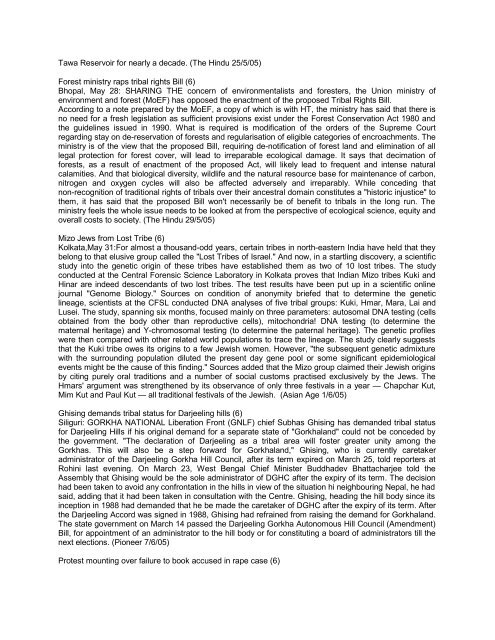You also want an ePaper? Increase the reach of your titles
YUMPU automatically turns print PDFs into web optimized ePapers that Google loves.
Tawa Reservoir for nearly a decade. (The Hindu 25/5/05)<br />
Forest ministry raps tribal rights Bill (6)<br />
Bhopal, May 28: SHARING THE concern of environmentalists and foresters, the Union ministry of<br />
environment and forest (MoEF) has opposed the enactment of the proposed Tribal Rights Bill.<br />
According to a note prepared by the MoEF, a copy of which is with HT, the ministry has said that there is<br />
no need for a fresh legislation as sufficient provisions exist under the Forest Conservation Act 1980 and<br />
the guidelines issued in 1990. What is required is modification of the orders of the Supreme Court<br />
regarding stay on de-reservation of forests and regularisation of eligible categories of encroachments. The<br />
ministry is of the view that the proposed Bill, requiring de-notification of forest land and elimination of all<br />
legal protection for forest cover, will lead to irreparable ecological damage. It says that decimation of<br />
forests, as a result of enactment of the proposed Act, will likely lead to frequent and intense natural<br />
calamities. And that biological diversity, wildlife and the natural resource base for maintenance of carbon,<br />
nitrogen and oxygen cycles will also be affected adversely and irreparably. While conceding that<br />
non-recognition of traditional rights of tribals over their ancestral domain constitutes a "historic injustice" to<br />
them, it has said that the proposed Bill won't necessarily be of benefit to tribals in the long run. The<br />
ministry feels the whole issue needs to be looked at from the perspective of ecological science, equity and<br />
overall costs to society. (The Hindu 29/5/05)<br />
Mizo Jews from Lost Tribe (6)<br />
Kolkata,May 31:For almost a thousand-odd years, certain tribes in north-eastern India have held that they<br />
belong to that elusive group called the "Lost Tribes of Israel." And now, in a startling discovery, a scientific<br />
study into the genetic origin of these tribes have established them as two of 10 lost tribes. The study<br />
conducted at the Central Forensic Science Laboratory in Kolkata proves that <strong>Indian</strong> Mizo tribes Kuki and<br />
Hinar are indeed descendants of two lost tribes. The test results have been put up in a scientific online<br />
journal "Genome Biology." Sources on condition of anonymity briefed that to determine the genetic<br />
lineage, scientists at the CFSL conducted DNA analyses of five tribal groups: Kuki, Hmar, Mara, Lai and<br />
Lusei. The study, spanning six months, focused mainly on three parameters: autosomal DNA testing (cells<br />
obtained from the body other than reproductive cells), mitochondria! DNA testing (to determine the<br />
maternal heritage) and Y-chromosomal testing (to determine the paternal heritage). The genetic profiles<br />
were then compared with other related world populations to trace the lineage. The study clearly suggests<br />
that the Kuki tribe owes its origins to a few Jewish women. However, "the subsequent genetic admixture<br />
with the surrounding population diluted the present day gene pool or some significant epidemiological<br />
events might be the cause of this finding." Sources added that the Mizo group claimed their Jewish origins<br />
by citing purely oral traditions and a number of social customs practised exclusively by the Jews. The<br />
Hmars' argument was strengthened by its observance of only three festivals in a year — Chapchar Kut,<br />
Mim Kut and Paul Kut — all traditional festivals of the Jewish. (Asian Age 1/6/05)<br />
Ghising demands tribal status for Darjeeling hills (6)<br />
Siliguri: GORKHA NATIONAL Liberation Front (GNLF) chief Subhas Ghising has demanded tribal status<br />
for Darjeeling Hills if his original demand for a separate state of "Gorkhaland" could not be conceded by<br />
the government. "The declaration of Darjeeling as a tribal area will foster greater unity among the<br />
Gorkhas. This will also be a step forward for Gorkhaland," Ghising, who is currently caretaker<br />
administrator of the Darjeeling Gorkha Hill Council, after its term expired on March 25, told reporters at<br />
Rohini last evening. On March 23, West Bengal Chief Minister Buddhadev Bhattacharjee told the<br />
Assembly that Ghising would be the sole administrator of DGHC after the expiry of its term. The decision<br />
had been taken to avoid any confrontation in the hills in view of the situation hi neighbouring Nepal, he had<br />
said, adding that it had been taken in consultation with the Centre. Ghising, heading the hill body since its<br />
inception in 1988 had demanded that he be made the caretaker of DGHC after the expiry of its term. After<br />
the Darjeeling Accord was signed in 1988, Ghising had refrained from raising the demand for Gorkhaland.<br />
The state government on March 14 passed the Darjeeling Gorkha Autonomous Hill Council (Amendment)<br />
Bill, for appointment of an administrator to the hill body or for constituting a board of administrators till the<br />
next elections. (Pioneer 7/6/05)<br />
Protest mounting over failure to book accused in rape case (6)

















